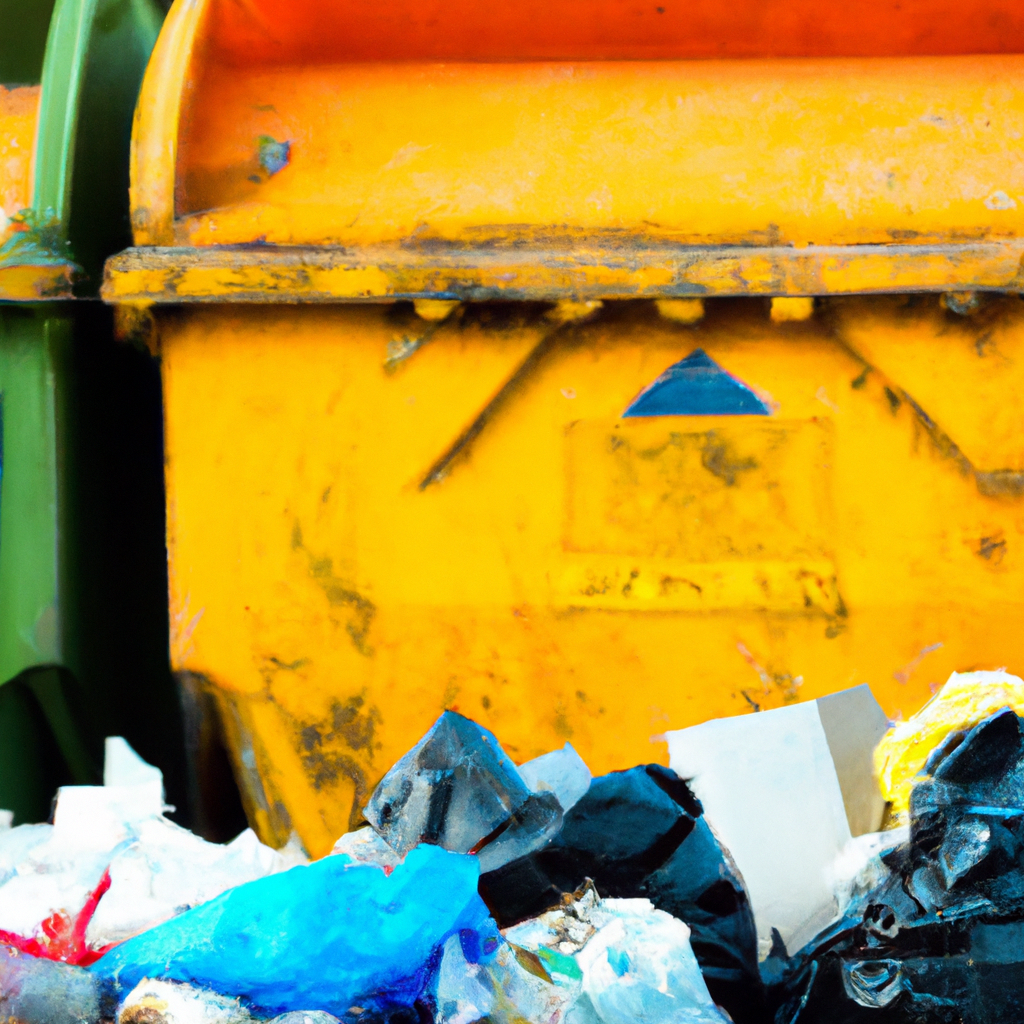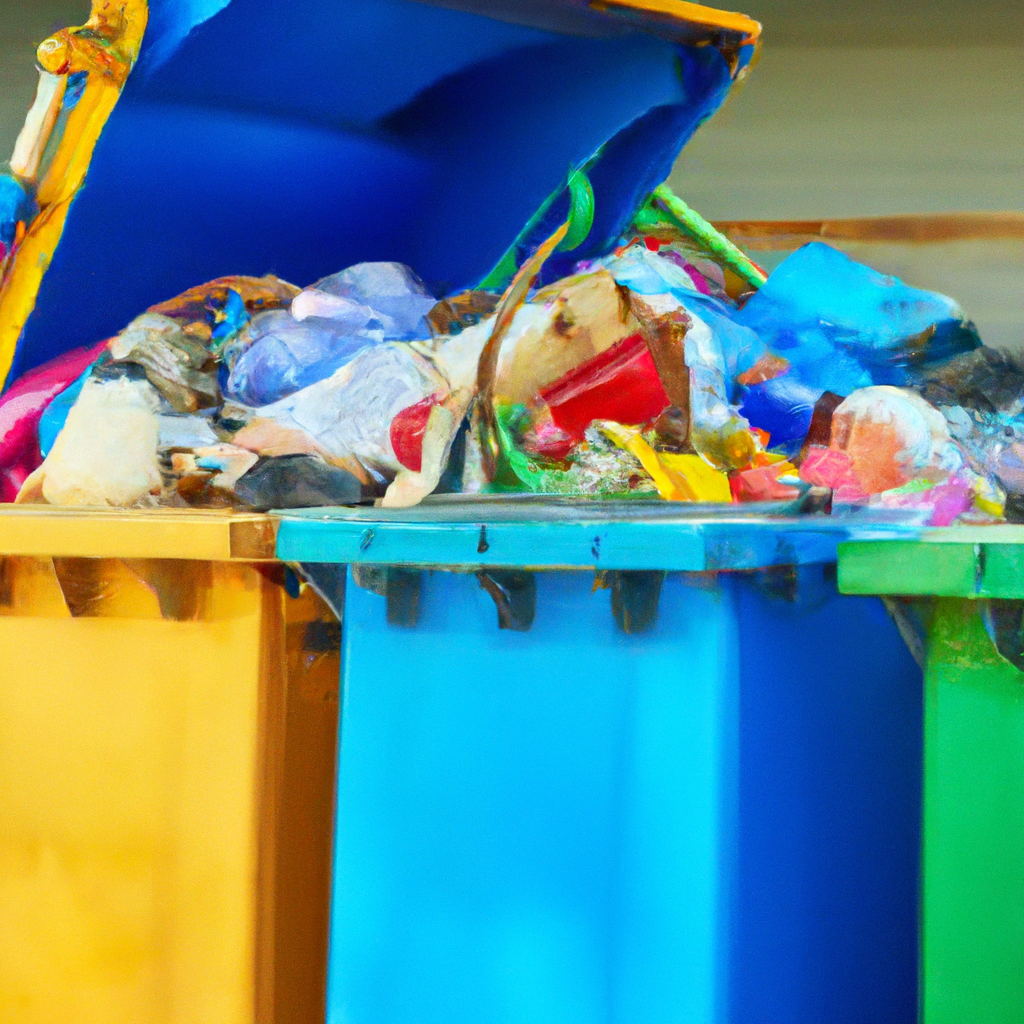If you’ve ever wondered how cleaning companies take care of the mess they create while making your space spotless, look no further. In this article, we’ll explore the common methods that cleaning companies use to handle the disposal of cleaning waste. From environmentally-friendly practices to proper waste management, you’ll gain insight into how these companies ensure a clean and sustainable process for both you and the environment. So, let’s dive in and discover the fascinating world of cleaning waste disposal!
Compliance with Regulations
Understanding Environmental Regulations
As a cleaning company, complying with environmental regulations is crucial to ensure the proper disposal of cleaning waste. It is essential to have a solid understanding of the regulations set by local, state, and federal authorities regarding waste management. These regulations outline the requirements for handling, storage, transportation, and disposal of cleaning waste.
Obtaining the Necessary Permits
To legally dispose of cleaning waste, it’s necessary to obtain the necessary permits and licenses from the relevant government agencies. This process ensures that cleaning companies are adhering to the specific regulations governing waste management. By obtaining the right permits, companies demonstrate their commitment to environmental responsibility and compliance.
Keeping Up with Regulatory Changes
Environmental regulations surrounding waste management can change over time. As such, it is vital for cleaning companies to stay up-to-date with these changes. Regularly reviewing and understanding any updates or amendments to regulations ensures that cleaning companies continue to operate in accordance with the law. This proactive approach reduces the risk of non-compliance and helps maintain a positive reputation as an environmentally responsible company.
Categorizing Cleaning Waste
Identifying Different Types of Waste
Cleaning waste can vary in its composition and level of hazard. It is essential to identify and understand the different types of waste generated during cleaning operations. Waste can include general trash, recyclables, biohazardous materials, hazardous chemicals, and more. By recognizing and classifying these waste types, cleaning companies can determine the appropriate methods for disposal and ensure compliance with regulations.
Classifying Waste According to Regulations
Regulatory agencies have specific requirements for the classification of waste. This classification helps determine how waste should be handled, stored, and transported. Cleaning companies must classify their waste accurately and according to the regulations in their jurisdiction. Proper waste classification is vital for ensuring the safety of employees, the public, and the environment throughout the waste management process.

Segregation and Storage
Separating Hazardous and Non-Hazardous Waste
Proper segregation of waste is crucial for efficient and safe waste management. Cleaning companies should separate hazardous and non-hazardous waste to prevent contamination and ensure appropriate handling. Segregating hazardous waste from non-hazardous waste also helps streamline disposal processes by directing waste to the correct treatment or disposal facilities.
Using Appropriate Containers
Utilizing suitable containers for waste storage is essential for maintaining the integrity of the waste and minimizing any potential risks. The containers chosen should be compatible with the specific waste being stored, ensuring they are durable, leak-proof, and safely contained. Using proper containers not only prevents spills and leaks but also facilitates the organization of waste for easier transportation and disposal.
Labeling and Proper Identification
Each container of waste should be properly labeled and identified to ensure clear communication and understanding of its contents. Labels should contain information such as the waste type, hazard level, contents, and any special handling instructions. Proper labeling helps prevent the mixing of incompatible waste and facilitates efficient waste management, transportation, and disposal processes.
Transportation to Waste Management Facilities
Choosing Authorized Waste Carriers
When transporting cleaning waste to waste management facilities, it is essential to work with authorized waste carriers. These carriers have the necessary permits and licenses and adhere to regulations regarding waste transportation. By partnering with authorized carriers, cleaning companies can ensure that their waste is transported safely and legally, minimizing any potential risks or penalties.
Using Specialized Transport Vehicles
Depending on the nature of the cleaning waste, specialized transport vehicles may be required for safe transportation. Hazardous chemicals, biohazardous materials, or large quantities of waste may call for specific vehicles equipped with features such as containment systems, temperature control, or ventilation. Using the appropriate specialized transport vehicles ensures that waste is transported securely and in compliance with regulations.
Ensuring Proper Packaging and Sealing
To prevent spills or leaks during transportation, waste must be packaged and sealed properly. This ensures that waste remains contained and does not pose any risk to the environment, transportation personnel, or the public. Cleaning companies should follow regulations and industry best practices concerning packaging and sealing waste to maintain the integrity of the waste and comply with transportation requirements.

Disposal Methods for Cleaning Waste
Waste Incineration
One disposal method for cleaning waste is incineration, which involves burning the waste at high temperatures. Incineration can effectively reduce the volume of waste and destroy harmful substances, making it a suitable option for certain types of cleaning waste. However, it is essential to comply with air quality regulations and choose certified incineration facilities to ensure the proper treatment and management of waste.
Landfill Disposal
In some cases, cleaning waste may be disposed of in landfills. However, this should be considered a last resort option, as landfill disposal has significant negative impacts on the environment. When utilizing landfills, it is crucial to follow all regulations regarding waste acceptance and disposal. Cleaning companies should aim to reduce waste generation and explore alternative disposal methods whenever possible.
Recovery and Recycling
Promoting a circular economy and minimizing waste generation should be a priority for cleaning companies. Waste recovery and recycling initiatives can help turn certain types of cleaning waste into valuable resources. By separating recyclable materials from the waste stream, cleaning companies can contribute to environmental sustainability while meeting regulatory requirements for waste management.
Biological Treatment
Certain types of cleaning waste, such as organic or biohazardous materials, can undergo biological treatment processes. This involves the use of microorganisms to break down and decompose the waste, converting it into harmless substances. Biological treatment methods, such as composting or anaerobic digestion, can be effective in reducing the environmental impact of cleaning waste while complying with regulations.
Chemical Treatment
Chemical treatment processes may be necessary for certain types of cleaning waste that contain hazardous substances. Chemical treatment involves using specific chemicals or reactions to neutralize or transform hazardous components into non-hazardous forms. This method ensures that the waste is effectively treated and can be disposed of safely, minimizing any potential risks or harm to the environment and public health.
Considerations for Hazardous Waste
Handling and Disposing of Hazardous Waste Properly
Hazardous waste can pose significant risks to human health and the environment if not handled and disposed of properly. Cleaning companies must take extra precautions when dealing with hazardous waste, following all applicable regulations and guidelines. This includes using appropriate containers, labeling clearly, and partnering with certified hazardous waste facilities for proper disposal.
Following Safety Precautions
When working with hazardous waste, safety should always be a top priority. Cleaning companies should train their employees on proper handling techniques, the use of personal protective equipment (PPE), and emergency response procedures. Following safety precautions minimizes the risk of accidents, exposures, and health hazards associated with hazardous waste.
Utilizing Certified Hazardous Waste Facilities
Hazardous waste requires specialized treatment and disposal facilities. Cleaning companies should partner with certified hazardous waste facilities that possess the expertise and equipment necessary to handle and dispose of hazardous waste safely. By utilizing these facilities, cleaning companies ensure compliance with all regulations and safeguard the environment and public health.
Documentation and Record-Keeping
Maintaining a Waste Management Log
Proper documentation and record-keeping are essential for demonstrating compliance with waste management regulations. Cleaning companies should maintain a waste management log that records all aspects of waste generation, handling, transportation, and disposal. This log serves as a valuable tool during regulatory inspections and ensures transparency and accountability in waste management practices.
Recording Waste Quantity and Composition
Alongside the waste management log, cleaning companies should record the quantity and composition of the waste generated. This information provides insights into waste generation patterns, allows for the identification of areas for improvement, and facilitates compliance reporting requirements. Accurate documentation ensures that cleaning companies can adequately manage and track their waste throughout the entire waste management process.
Keeping Records for Regulatory Inspections
Inspectors from regulatory agencies may conduct periodic audits or inspections to ensure compliance with waste management regulations. Cleaning companies must be prepared for these inspections by maintaining organized and up-to-date records. Having detailed records readily available for review demonstrates a commitment to compliance and makes the inspection process smoother.
Training and Employee Safety
Providing Proper Training on Waste Handling
To ensure the safe and compliant management of cleaning waste, cleaning company employees must receive proper training. This training should cover waste identification, classification, segregation, handling techniques, the use of personal protective equipment (PPE), and emergency response procedures. Well-trained employees are better equipped to handle waste safely, reducing the risk of accidents, injuries, and environmental harm.
Implementing Safety Measures
Cleaning companies should prioritize employee safety by implementing safety measures throughout the waste management process. This includes providing the necessary equipment, tools, and resources to handle waste safely. Safety measures may also include clear signage, designated waste storage areas, and protocols for waste-related tasks. By proactively addressing safety concerns, companies foster a culture of safety and minimize potential risks associated with waste management.
Using Personal Protective Equipment
Personal protective equipment (PPE) plays a vital role in ensuring employee safety during waste handling and management. Cleaning companies should provide employees with appropriate PPE, such as gloves, goggles, masks, or protective clothing, based on the specific hazards associated with the waste being handled. Proper usage of PPE minimizes the risk of exposure and protects employees from potential health hazards.
Environmental Responsibility
Using Eco-Friendly Cleaning Practices
Cleaning companies can significantly contribute to environmental responsibility by adopting eco-friendly cleaning practices. This includes using environmentally friendly cleaning products, reducing water and energy consumption, and implementing sustainable cleaning techniques. By prioritizing environmentally friendly practices, cleaning companies actively mitigate the impact of their operations on the environment and public health.
Opting for Green Certification
Obtaining green certifications, such as Leadership in Energy and Environmental Design (LEED) or Green Seal, showcases a cleaning company’s commitment to sustainability and environmental responsibility. Green certifications provide third-party validation of a company’s eco-friendly practices and set them apart as leaders in the industry. Customers seeking environmentally responsible cleaning services are likely to choose certified companies, benefiting both the environment and the business.
Reducing Waste Generation
One of the most effective ways for cleaning companies to minimize their environmental impact is by reducing waste generation. Implementing waste reduction strategies, such as using concentrated cleaning products or implementing refillable container programs, can significantly reduce the amount of waste generated. By embracing waste reduction practices, companies demonstrate their commitment to sustainability and contribute to a cleaner, healthier environment.
Collaboration with Waste Management Professionals
Seeking Expert Advice and Guidance
Cleaning companies benefit from collaborating with waste management professionals who possess expertise in waste handling and management. Seeking advice and guidance from professionals ensures that cleaning companies stay up-to-date with the latest regulations, best practices, and technological advancements in waste management. This collaboration enables cleaning companies to optimize their waste management processes and contribute to environmental sustainability effectively.
Building Relationships with Waste Management Companies
Establishing strong relationships with waste management companies is invaluable for cleaning companies. By working closely with waste management professionals, cleaning companies can ensure the proper and compliant disposal of their cleaning waste. These partnerships provide access to specialized waste management services, advice on waste reduction strategies, and reliable support for waste handling, transportation, and disposal needs.
In conclusion, compliance with regulations, proper categorization and storage of cleaning waste, appropriate transportation, and careful choice of disposal methods are all crucial for cleaning companies to handle waste effectively. By following best practices, prioritizing environmental responsibility, and collaborating with waste management professionals, cleaning companies can ensure the safe and compliant management of cleaning waste while contributing to a cleaner, healthier environment.
